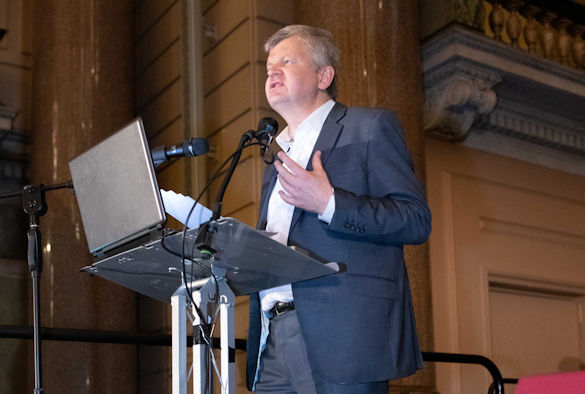
On Friday, 18 January 2019, TV and radio presenter Adrian Chiles helped launch a new research centre, which is designed to understand the drivers and consequences of alcohol misuse, and to develop new treatments, interventions and policies in response.
Alcohol is the third leading cause worldwide for chronic disease with more than 60 diseases associated with alcohol consumption, including various common cancers. In 2010, 270,624 years of life were lost (deaths under 75 years) due to alcohol in the UK, and the Liverpool City Region has some of the highest rates of morbidity and mortality associated with alcohol in the country.
The Liverpool Centre for Alcohol Research (LCAR) will bring together experts from the University of Liverpool, Liverpool John Moores University and local NHS trusts through Liverpool Health Partners to work on the advancement of alcohol-related research and education. It will focus on four main areas of research and practice and, crucially, the multidisciplinary synergies between them: liver (and other end organ) diseases; mental health; cancer; and public health and associated policy.
Experts have reported that a research centre with this breadth and depth of expertise, combined with its partnership model involving academics and clinicians, will be unique in the UK.
Major impact on patient care
Professor Sir Ian Gilmore will be leading on the centre; he is a liver specialist at The Royal Liverpool and Broadgreen University Hospitals NHS Trust and The University of Liverpool with many years’ experience in managing patients with alcohol-related diseases. Ten years ago, whilst President of the Royal college of Physician’s, he set up the Alcohol Health Alliance UK and is still its Chairman. This brings together about 50 organisations who share the aim of reducing alcohol-related harm to health.
Professor Sir Gilmore, said: “I look forward to developing the new Liverpool Centre for Alcohol Research and to working with partners to create a leading programme of research that will have major impact on patient care at the local, national and international level.
“Alcohol research is not a new proposition, it is the underlying strategy that is unique. Through partnership-led, translation-focused working, we hope to make advances in an area that is lacking interventions that have significant scale and reach. The increasing affordability, availability and acceptability of alcohol since the 1980s has resulted in a rising number of negative consequences that is placing a strain on the NHS, other treatment provisions, families and society in general. The recent advances made in data handling and laboratory analytics means that science is entering a new age of collaborative working that has the promise of furthering many fields. Asking the right questions and ensuring the correct skill-mix is vital to realising this potential.
“Liverpool offers many excellent opportunities for alcohol-related research, spanning from psychology, public health and primary care, to basic science and translational research, as well as clinical studies that improve our understanding and treatment of alcohol-related conditions.”
Professor Robin Leatherbarrow, Liverpool John Moores University’s Pro-Vice-Chancellor Scholarship, Research and Knowledge Transfer, said: “The Centre for Alcohol Research will develop world-leading research in an area that represents a major health issue for our local population. As a university that is committed to playing a pivotal role in our civic agenda, Liverpool John Moores University is proud to be one of the founding partners of this new Centre. We look forward to our joint activities leading to significant improvements in the area of alcohol-related disease.”
Alcohol intake
Earlier this year Adrian Chiles took part in a documentary entitled ‘Drinkers Like Us’ that recorded how many units he was drinking. Adrian, who sees himself as a social drinker and not an alcoholic, said he wanted to make the programme after being interested in people’s ideas of what type of drinking counts as alcoholism. The programme found that he sometimes drank 80 or 100 units a week which was well over the recommended weekly 14 units (The NHS advises men and women not to drink more than 14 units a week – equivalent to six pints of average-strength beer or 10 small glasses of wine). Adrian now urges people to track their alcohol intake.
Adrian is supportive of the new centre and spoke about his own experiences and the importance of alcohol related research during the launch.
The LCAR was officially launched at a special event hosted at St George’s Hall, Liverpool.
More information about the centre can be found here.
